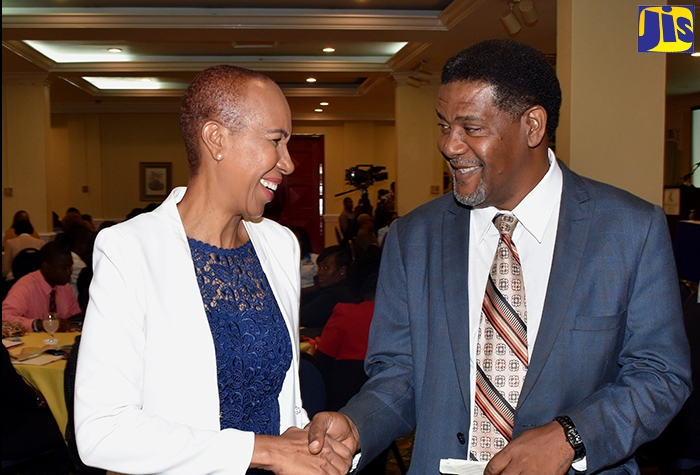Collective Efforts Needed To Fight Corruption – Minister Williams
By: , November 2, 2018The Key Point:
The Facts
- Mrs. Williams acknowledged that significant work has been undertaken and progress made in this regard, resulting in Jamaica’s improved ranking to 68th out of 180 countries on Transparency International’s 2017 Corruption Perception Index, up from 83rd in 2016.
- While citing this as a notable achievement, the Minister emphasised that “we cannot stop there”.
The Full Story
Minister without Portfolio in the Ministry of Finance and the Public Service, Hon. Fayval Williams, says ongoing collective efforts are needed to achieve further reduction in corruption.
Mrs. Williams acknowledged that significant work has been undertaken and progress made in this regard, resulting in Jamaica’s improved ranking to 68th out of 180 countries on Transparency International’s 2017 Corruption Perception Index, up from 83rd in 2016.
While citing this as a notable achievement, the Minister emphasised that “we cannot stop there”.
“We have to continue with our efforts to implement laws and policies that can prevent, detect, and prosecute corrupt perpetrators. Combating corruption and promoting transparency in our society will be as a result of the active involvement of all stakeholders,” Mrs. Williams emphasised.
She was speaking at the Government of Jamaica Audit Commission’s annual Audit Committees’ Conference, held recently at The Knutsford Court Hotel in New Kingston.
Mrs. Williams highlighted several measures that she said are demonstrative of the Government’s zero-tolerance approach to corruption.
These, she noted, include the passage of the Integrity Commission Act, which seeks to promote and enhance standards of ethical conduct for Parliamentarians, officials and others, as well as the establishment of an Integrity Commission.
Additionally, she cited publication of instruments to improve corporate governance of public bodies; and passage of the Public Procurement Act 2015, and its subsequent amendments in 2018.
Mrs. Williams further pointed out that the Finance Ministry continues to facilitate training for public procurement practitioners.
“These are steps [aimed at] helping us to attain our goal of having sustainable systems that can curtail corruption and increase transparency in the award and execution of contracts as well as put teeth into the rule of law,” she noted.
The Minister further cited establishment of several government institutions to deal with corruption.
These, she said, include the Revenue Protection Division, which has responsibility for preventing corruption and prosecuting individuals deemed corrupt; and the Financial Investigation Division, which was established to deter money laundering and other financial crimes by seizing and forfeiting assets that are illegally obtained, thereby removing the profit out of crime.
“These laws, systems and policies find synergy with the overall thrust towards sustaining an ethical environment where the poor and most vulnerable in our society [are afforded] access to basic amenities and services provided by the Government,” the Minister said.
Noting a recent World Bank Report, which estimates that global losses to corruption amount to “trillions of dollars”, Mrs. Williams argued that “corruption, from any perspective, is a major obstacle to democracy and the rule of law”
“It impacts societies in a multitude of ways. Simply put… it costs lives, and it costs people their freedom, their health and their money,” she said.
Economically, the Minister added, corruption depletes national wealth, hinders the development of good governance structures, and distorts competing and desirous investments.
Additionally, Mrs. Williams said the World Bank reports that empirical studies on several countries have shown that the poor and vulnerable pay the highest percentage of their income in bribes in order to “beat the system”.
“We can all agree that corruption erodes the societal fabric, it undermines trust in the political system, its institutions and its leadership. As leaders and advocates for good governance, we have a responsibility to test the ethical temperature of the organisations that we serve,” she argued.
The Minister contended that audits should reveal whether transparency exists behind key decisions, whether employees trust the whistle-blower process and have confidence that there will be no retaliation against those who use it, and whether management is “giving tacit approval to unethical practices by doing nothing”.
“Our job… your job… my job… is not an easy one; some might find it daunting. But the Ministry of Finance and the Public Service is committed to its vision of becoming a Centre of Excellence that enables sustainable growth and development through sound policy planning and quality service delivery,” Mrs. Williams said.
This vision, she indicated, requires committed audit committee members “who are well equipped to [deal with] the challenge of providing effective oversight that includes a heightened sense of awareness [of] the tools that can be leveraged in combating corruption and promoting transparency”.
The Audit Committees’ Conference was held in collaboration with the Finance Ministry under the theme ‘Audit Committees: Combatting Corruption, Promoting Transparency’.




